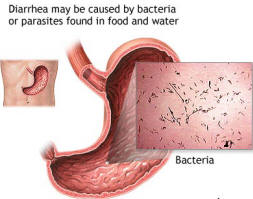- Home
- Editorial
- News
- Practice Guidelines
- Anesthesiology Guidelines
- Cancer Guidelines
- Cardiac Sciences Guidelines
- Critical Care Guidelines
- Dentistry Guidelines
- Dermatology Guidelines
- Diabetes and Endo Guidelines
- Diagnostics Guidelines
- ENT Guidelines
- Featured Practice Guidelines
- Gastroenterology Guidelines
- Geriatrics Guidelines
- Medicine Guidelines
- Nephrology Guidelines
- Neurosciences Guidelines
- Obs and Gynae Guidelines
- Ophthalmology Guidelines
- Orthopaedics Guidelines
- Paediatrics Guidelines
- Psychiatry Guidelines
- Pulmonology Guidelines
- Radiology Guidelines
- Surgery Guidelines
- Urology Guidelines
Study finds if diarrhea serves a purpose

Washington D.C.: Despite thousands of years of pant-crapping history, there's a surprising amount we don't know about diarrhea. Does it actually help clear the bacteria causing a gastrointestinal infection, or is it merely a symptom of disease that should be prevented as much as possible?
In a new study from Brigham and Women's Hospital, investigators explore the immune mechanism that drives diarrhea, concluding that it does play a critical role in pathogen clearance in the early stages of infection.
The new study, published in Cell Host and Microbe, also uncovers a previously unrecognized role for interleukin-22, an immune system molecule, in the host's defense against infection.
"The hypothesis that diarrhea clears intestinal pathogens has been debated for centuries," said corresponding author Jerrold Turner, MD, PhD, of the BWH Departments of Pathology and Medicine.
"Its impact on the progression of intestinal infections remains poorly understood. We sought to define the role of diarrhea and to see if preventing it might actually delay pathogen clearance and prolong disease."
To investigate, researchers used a mouse model infected with Citrobacter rodentium, the mouse equivalent of an E. coli infection. Using this model, they saw an increase in the permeability of the intestinal barrier within just two days of infection -- well before inflammation and epithelial damage.
In particular, they uncovered a critical role for interleukin-22 that in turn influences another molecule called claudin-2, previously known to be involved in causing diarrhea.
They found that diarrhea resulting from the signaling of these two molecules helped promote pathogen clearance and limited disease severity.
Other investigators have proposed developing new therapeutics to inhibit claudin-2. However, Turner and colleagues explain that the activation of this pathway may be critical for combating an infection, particularly in the early stages of a disease.
They conclude that diarrhea is critical to enteric pathogen clearance, and that IL-22 may play a key role in host defense.

Disclaimer: This site is primarily intended for healthcare professionals. Any content/information on this website does not replace the advice of medical and/or health professionals and should not be construed as medical/diagnostic advice/endorsement or prescription. Use of this site is subject to our terms of use, privacy policy, advertisement policy. © 2020 Minerva Medical Treatment Pvt Ltd